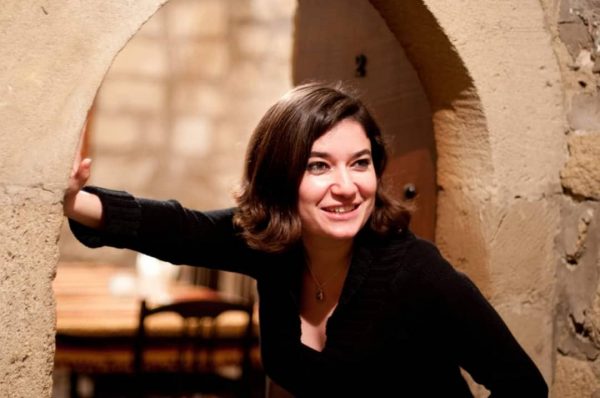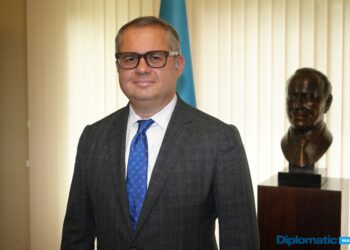Bilaterally, Nigeria and Azerbaijan do not maintain any diplomatic ties but there are efforts put into making this a reality in no distant time. Speaking with Billura Bayramova, an Expatriate in Nigeria and Founder, Friends of Azerbaijan Organization gives evidence to the foregoing. She has for over half a decade made very fascinating moves to see that her country, Azerbaijan and Nigeria form relations including economic, political, cultural that will run along bilateral lines. In this interview with Diplomatic Watch, she tells her how she enlightens other expatriates about the positive side of Nigeria and its concomitant opportunities. Billura also informed about the prospects in both countries cooperating together and several other issues worth reading.
DW: Can we meet you Madam?
Billura: I am Billura Bayramova from Azerbaijan. I moved into Nigeria with my family about 6 years ago, precisely in 2013. My husband works in the Oil and Gas sector in Nigeria. You know Azerbaijan has oil just like Nigeria. And so we left Azerbaijan for France for a few months before moving down to Nigeria. We actually moved to Nigeria to work. It was while in Nigeria that I began to engage some non-governmental organizations, and I also began to promote bilateral relationship between Azerbaijan and Nigeria.
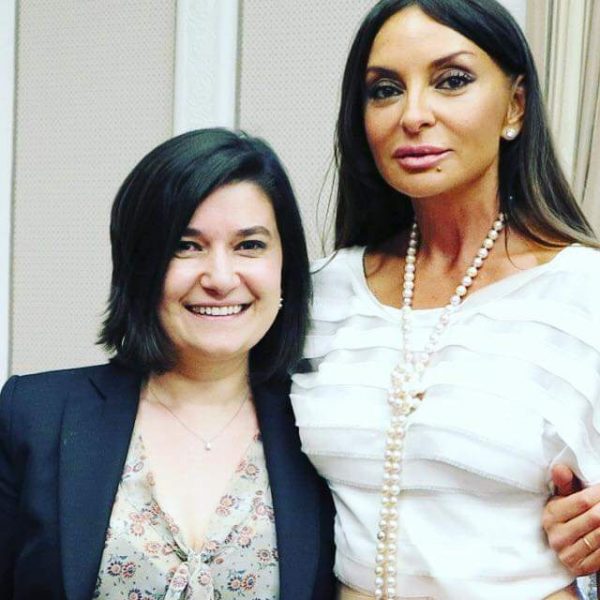
DW: What inspired you to start the organization?
Billura: I think for me it comes natural when you go out of your country to a different culture and to a different continent. It was the first time for me to be in this part of Africa and also the first time to be in the Continent of Africa. I couldn’t find any Azerbaijani in the beginning and of course you feel like you are alone and especially when you talk about your country people don’t know and do not have information about the country. So, then I thought to myself, I have to do something about promoting my country which has always been a part of me.
I also love culture. So, it doesn’t matter if I am English or American I would have done the same just to develop the cultural and political relationship between Nigeria and my country, let alone Azerbaijan which seemingly do not have diplomatic ties with Nigeria. There is no direct relationship at the moment.
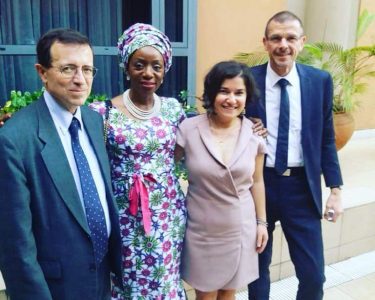
However, there is an embassy of Nigeria which is situated in Iran but also useful for Azerbaijan. There are some Azerbaijani embassies or consulates in some countries such as South Africa and Ethiopia but not in Nigeria.
With this existing bureaucracy that makes it difficult for people to travel to these countries to obtain visas to Azerbaijan, my first interest was stimulated to bridge the gap. I realized they were several people who were interested in knowing about Azerbaijan and who wanted to travel there but had visa problems. They decided to join organizations like the International Women Organization for charity; they organized big events for charity and each country represented had their own stand. I joined the board of the organization and of course I started to represent Azerbaijan at my country’s stand. Even though I was alone, I took this big responsibility on my shoulders to begin to promote my country’s culture, food, dance, music and so on.
For an example, Banana cultural festival is organized annually at Banana Island in Lagos. Several countries are represented at their stands with their own cultural display; dance, music etc. And I joined also. So, every year I represent Azerbaijan in the festival. As time went on, I decided to do it the official way. To achieve this, I created Friends of Azerbaijan Organization owing to my more than 2 decades experience in the Non-governmental organization sector. It was easy for me to open this association but not without the help of my friends; Nigerians and non-Nigerians alike. So, this was how I started to go on this path.
DW: You have been a social worker yourself, and how can people be part of what you do?
Billura: So, you have to be a member of Friends of Azerbaijan Organization. It doesn’t matter where you live or where you are a resident, you can be a part of this organization. One of the aims is to bring Azerbaijanis and non-Azerbaijanis together in Nigeria and all around the world and to create a platform for the advancement of Azerbaijan and Nigeria relationship. I started to invest my time in looking up Nigerians that live in Azerbaijan. I found in Azerbaijan that more than 60 Nigerians live there. Some of them are expatriates, with appreciable number of them having emigrated to study, and or ended up married to Azerbaijanis. So, this is how I started to find these Nigerians. I later began to contact each of them.
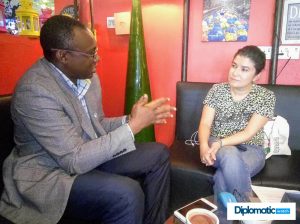
In similar vein, I started to get messages from other Azerbaijanis who live here in Nigeria. I found in Abuja that there is a lady that married a Nigerian and who has lived there since 2003. And I discovered that there is a lady in Lagos who married a Nigerian and lived here since 1972. That was how the organization began to form while including our kids because they also have Azerbaijan nationality. I found eleven or more Azerbaijanis but just because we don’t have a diplomatic relationship, it was tough for them to contact us directly in order to be registered with the organization. This has not hindered the good relationship existing between both communities in Nigeria and Azerbaijan.
I also met one of the beautiful ladies, a Nigerian journalist and also a book writer and an Editor, Jennifer Gentet. She has a TV programme, through which she showcases the life of Nigerians in the Diaspora. It was interesting for us to work together. We traveled together in March of 2018 to Azerbaijan for ten days. We met the Nigerian community and their families including their children. We started to underscore their way of life in Nigeria and in parallel we highlighted the socio-cultural and historical sides of Azerbaijan.
These stories are in seven episodes and on air across some TV stations. Consequently, I received some letters from people indicating interest to join the association which partly aid people to explore tourism opportunities in Azerbaijan. For some of them, it was to attend conferences. For instance, some of them who worked with the Nigerian Customs Service needed the requisite travel documents to be in attendance at an international conference organized for them in Baku.
Of course, most of them contacted me for visas or on how to get visa. I tried to offer help and some of them eventually worked out. I remain thankful to our Diaspora community in Azerbaijan who facilitated visas for Nigerians who wish to emigrate or visit Azerbaijan. It is also same for Azerbaijanis. Some Azerbaijani companies are interested in coming to Nigeria to invest. So, we are trying to bring them in, organize meeting with their Nigerian counterparts and for them to see the Nigerian market to determine what they can do over here. There are huge opportunities in Nigeria and Azerbaijan even though when compared in terms of population size, Azerbaijan is a small country with about 10 million people and Nigeria is 200 million. As I said earlier, we have oil.
This brings us together because of our similarity in the oil deposit. It can strengthen our ties in the energy sector. I am working on helping these companies come to Nigeria to avoid them going to England or other countries to get their visas. I am getting visas for them through my organization here, on arrival for them to ensure their visits are easy.
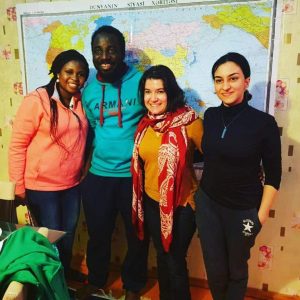
DW: How do you mean when you said that the Nigerian immigration service has been helpful?
Billura: I am very impressed with the Nigerian Immigration Service’s system because of the visa on arrival policy. I applied online and sent them official documents online. The process was simple. There is no corruption. You don’t even pay online. Everyone pays with his or her credit or debit card on arrival at the airport which makes it easy for people. In similar way, the Government in Azerbaijan is developing easy visa system. Some countries on the approved list can get visa on arrival. Unfortunately, Nigeria is not yet on the list of countries that get visa on arrival. I am hoping soon Nigeria will be enlisted for the visa on arrival programme.
DW: How does an interested person become part of Friends of Azerbaijan?
Billura: It is very easy. There is an annual registration fee to become a member of the organization. As soon as you become a member you will receive emails containing information about what we do and what we want to organize. Last year I arranged two classic concerts in Muson (Musical Society of Nigeria) centre. Muson is a non-governmental and non-profit organization, and that is one of the reasons for supporting Muson centre. It is governed by professionals and technocrats who are volunteering their time and resources. It is very important to me supporting these kind of people or organizations of that kind. They are doing something commendable. Giving time to a project is not easy. It is very easy to go to work to get monthly salary instead. But to be a volunteer is not easy, so I appreciate them a lot.
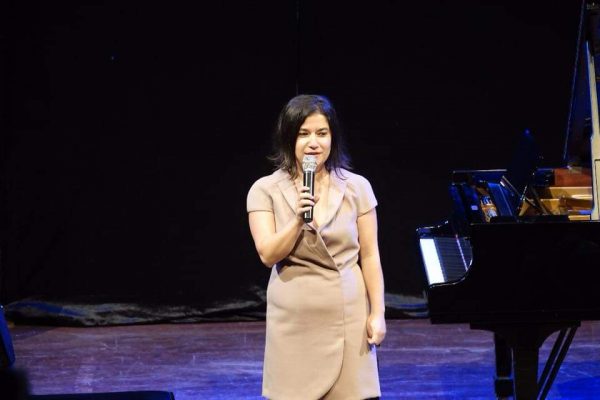
Before we -expatriates- come to Nigeria, we want to resist coming here. This feeling is almost general and involves a ridiculous 99 percent of expatriates. The fear of Nigeria ranges from Boko Haram to kidnapping and to even poverty. Unfortunately, the media doesn’t show the positive sides of the country. They want to show the political side; and what they want to show. For me, it was the same when my husband said we were going to Nigeria and I said “never ever”, do I want to go to that country. It was difficult to make up my mind to come. I remember even when we arrived, I had aluminum/foil papers in my luggage because I thought I was going to the jungle. I am sorry to say this but I had a certain impression because of what I had consumed from the media.
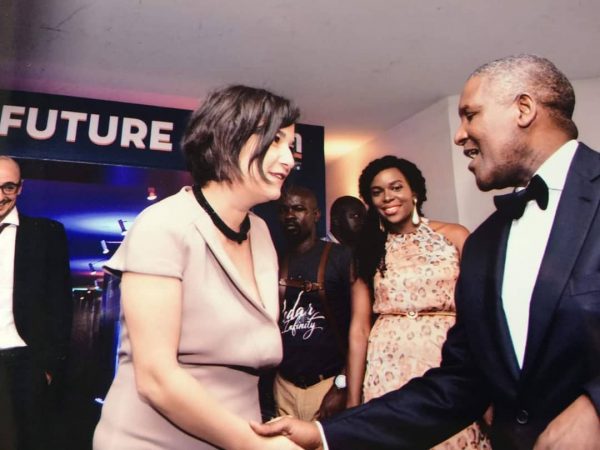
Today, that hasn’t changed. Of course it comes to a stage one doesn’t have to believe all he or she sees or hears from the media. Furthermore, when I arrived in Lagos, I realized we have nice supermarkets and restaurants. And then the cultural side of Nigeria which is hardly shown by the media as well. Most of the companies where expatriates work have certain restrictions. For instance, you cannot go out without a Police escort, and you cannot go out at a certain time. You cannot drive yourself or you cannot drive 20 km out of Lagos, which make expatriates lives restricted. We could not go out of the circle because of all these restrictions. I couldn’t take it because it was very boring for me. Therefore, I started to look around to find out what is in Nigeria. I didn’t want to stay in the expatriates’ community. I wanted to go out of it and answer some mind boggling questions such as who are Nigerians? What is Africa actually? And who are black Africans? In France, we see Africans around and we all lived together. But what is their culture? What do they eat? What is their music? All these answers we cannot find especially in Azerbaijan and as they are very few Africans.
With all these questions in my mind, I realized it was about that time I found out about Muson Centre. I was just amazed that it has been existing. There was classic music. There was opera. There was theatre. There is everything. Of course you cannot compare it with Paris but there is. I started to go very often to Muson centre and out of there I began to meet famous celebrities and artistes. It didn’t stop there, we started going to African shrine in Ikeja to see Femi Kuti perform since we knew about Fela, we wanted to see his place and to see his son on stage. This was how I entered into the Nigerian lifestyle.
I was going to Lekki market and to Balogun Market and other markets we saw and found through Google. Then I stated to talk to expatriates over here. I served as their tour guide in Lagos and I did it for free. I was spending my time with them, taking them around. I kept telling them that “there was no need to be afraid because these people are so friendly especially Nigerian people. They have smiles on their faces. They are very happy. It is just their lives that are difficult but they are very happy and very friendly”.
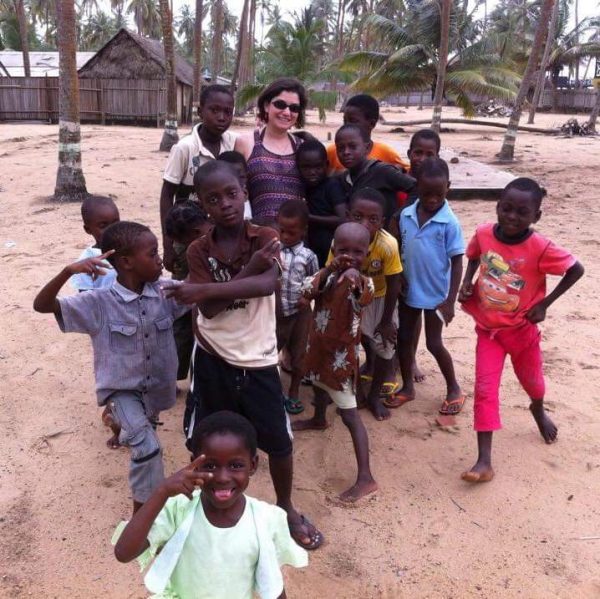
I could now go without any invitation to their local markets to be with them, to talk to them and to try their food. I could even go out of Lagos. We have been to Ibadan, Oyo and Oshogho. I flew to Port Harcourt too to also satisfy my curiosity because my husband goes there often. I almost became Nigerian. I have three boys now. I decided to give birth to my third born here. I know even Nigerians go out of the country to give birth. But I said ‘No’ and I will do the exception. Even all the people around me told me “you are crazy to give birth here because it is a risk”. I eventually had my third born in Nigeria as it went very successful.
So back to the question, it is for whoever that wants to be part of Friends of Azerbaijan organization especially for the expatriates. Through this organization, I give information about Nigeria, the Nigerian culture and events; what is happening here. I am still supporting Muson Centre. We are partners. We jointly organized two concerts last year which I brought two artistes. One from Azerbaijan and another Pianist, who is an Azerbaijani that lives in Paris. These were very successful events. One of the events was during Muson Festival. It was the first time that an international artiste joined the Muson festival. I will continue with this task. This is the first project that shows the relationship between Nigeria and Azerbaijan
DW: Beyond Oil and Gas, and then culture what else do you think can promote relationship between Nigeria and Azerbaijan?
Billura: It can be food business, it can be agriculture. It can be also education and health. I think it was a few days ago Nigerian Air force had a visit to Azerbaijan to commence economic cooperation. The government already set the stage for their visit.
From my point of view, Azerbaijanis here in Nigeria can develop business relationships focused on health, education and agriculture which I believe will be very effective. Take for instance, there are some types of Nigerian food that we don’t have in Azerbaijan. So, interactions can be on Exchange programmes, health-related and educational programmes between the two countries. I do get information from some companies regarding health, education, agriculture and technology. I assist some of them to remove bureaucracy in Government and to stop any form of corruption. All these are aimed at developing hot lines, easy visa and a less complex system for people to get their International passports and other official documents and so on. We are optimistic it will work in this region as well.
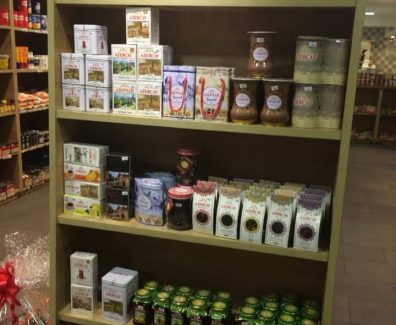 I have commenced importation of Azerbaijan products such as Azerbaijan tea and some other products made in Azerbaijan. It is already in one of the Supermarkets in Lagos. I do hope it will work because the products are very good but it is normal to test the market because the market is big. People have to know about the country first and then about the product to make their purchase. For this reason, we decided to start small. I am sure it will help improve relationships too.
I have commenced importation of Azerbaijan products such as Azerbaijan tea and some other products made in Azerbaijan. It is already in one of the Supermarkets in Lagos. I do hope it will work because the products are very good but it is normal to test the market because the market is big. People have to know about the country first and then about the product to make their purchase. For this reason, we decided to start small. I am sure it will help improve relationships too.
DW: What are your final words to Nigerians and Azerbaijanis?
Billura: I just want to tell them that Friends of Azerbaijan Organization is here to help them visit both countries; to know about different cultures, history and food and to know about everything actually. Azerbaijan and Nigeria are two different worlds. Sometimes for Azerbaijanis when you say you are living in Nigeria, they say “my God it is too far; how could you think of going there”. Visiting Nigeria is one of the opportunities we seek to create and we are opening it up for Azerbaijani people to come to visit this world and for Nigerians to go visit another world (Azerbaijan). I love Nigeria.

